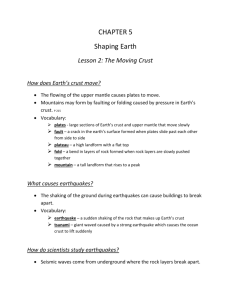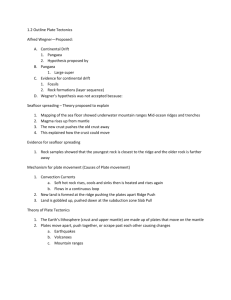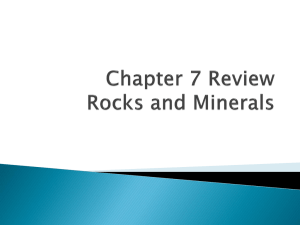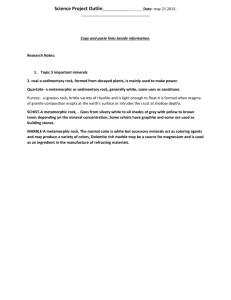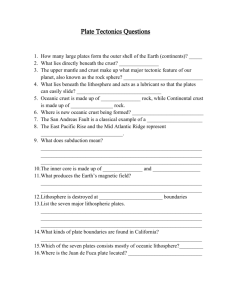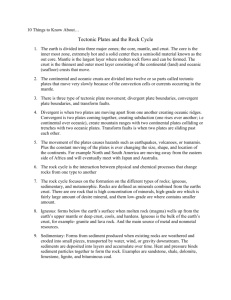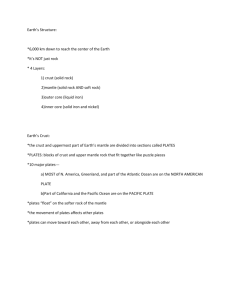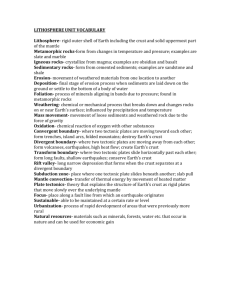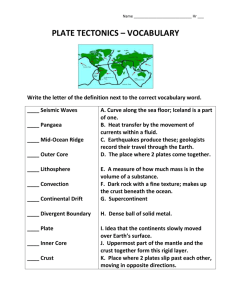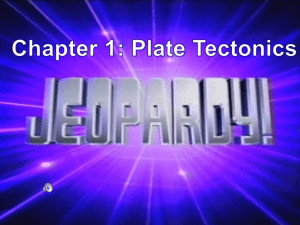Earth Movements Study Guide
advertisement
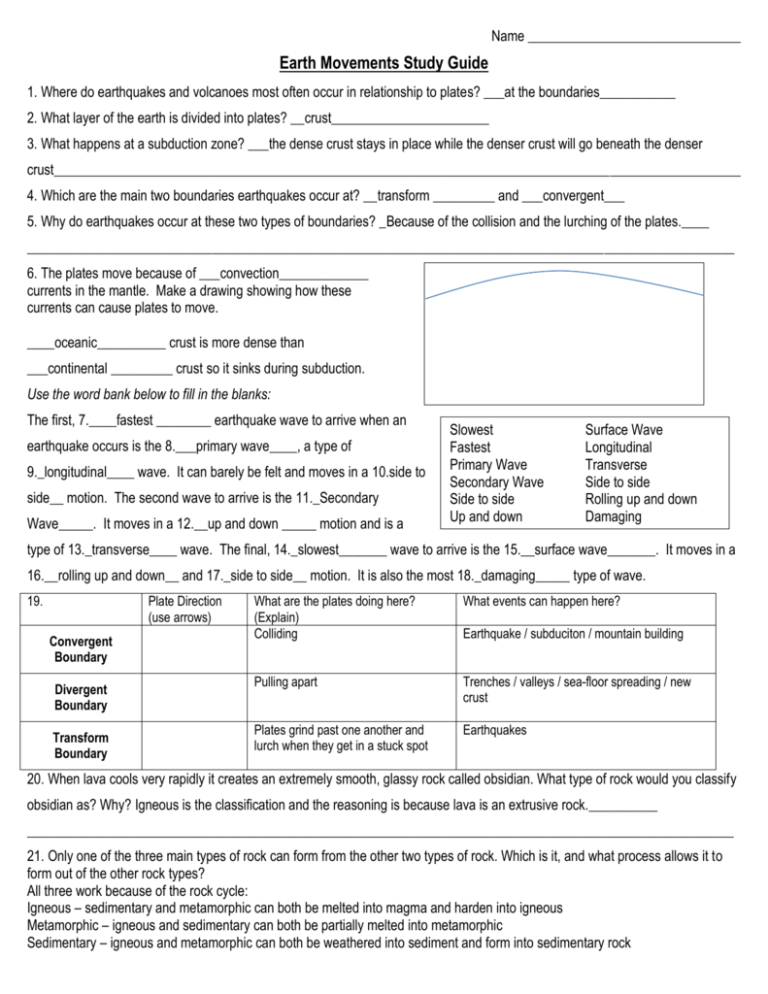
Name _______________________________ Earth Movements Study Guide 1. Where do earthquakes and volcanoes most often occur in relationship to plates? ___at the boundaries___________ 2. What layer of the earth is divided into plates? __crust_______________________ 3. What happens at a subduction zone? ___the dense crust stays in place while the denser crust will go beneath the denser crust____________________________________________________________________________________________________ 4. Which are the main two boundaries earthquakes occur at? __transform _________ and ___convergent___ 5. Why do earthquakes occur at these two types of boundaries? _Because of the collision and the lurching of the plates.____ _______________________________________________________________________________________________________ 6. The plates move because of ___convection_____________ currents in the mantle. Make a drawing showing how these currents can cause plates to move. ____oceanic__________ crust is more dense than ___continental _________ crust so it sinks during subduction. Use the word bank below to fill in the blanks: The first, 7.____fastest ________ earthquake wave to arrive when an earthquake occurs is the 8.___primary wave____, a type of 9._longitudinal____ wave. It can barely be felt and moves in a 10.side to side__ motion. The second wave to arrive is the 11._Secondary Wave_____. It moves in a 12.__up and down _____ motion and is a Slowest Fastest Primary Wave Secondary Wave Side to side Up and down Surface Wave Longitudinal Transverse Side to side Rolling up and down Damaging type of 13._transverse____ wave. The final, 14._slowest_______ wave to arrive is the 15.__surface wave_______. It moves in a 16.__rolling up and down__ and 17._side to side__ motion. It is also the most 18._damaging_____ type of wave. 19. Plate Direction (use arrows) Convergent Boundary Divergent Boundary Transform Boundary What are the plates doing here? (Explain) Colliding What events can happen here? Pulling apart Trenches / valleys / sea-floor spreading / new crust Plates grind past one another and lurch when they get in a stuck spot Earthquakes Earthquake / subduciton / mountain building 20. When lava cools very rapidly it creates an extremely smooth, glassy rock called obsidian. What type of rock would you classify obsidian as? Why? Igneous is the classification and the reasoning is because lava is an extrusive rock.__________ _______________________________________________________________________________________________________ 21. Only one of the three main types of rock can form from the other two types of rock. Which is it, and what process allows it to form out of the other rock types? All three work because of the rock cycle: Igneous – sedimentary and metamorphic can both be melted into magma and harden into igneous Metamorphic – igneous and sedimentary can both be partially melted into metamorphic Sedimentary – igneous and metamorphic can both be weathered into sediment and form into sedimentary rock 22. Because many rivers run into the Gulf of Mexico, you would expect gulf-states such as Florida, Alabama, Mississippi, Louisiana, and Texas to have an abundance of which type of rock? Explain your answer. Sedimentary rock because the rocks break down and form layers. ___________________________________________________________________ 23. Are magma and lava the same thing? Explain your answer. _No, lava is on the outside of a volcano – extrusive and magma is located inside a volcano intrusive. _ 24. Label Earth’s layers on the diagram to the right and its state of matter. 25. The Earth has four layers. The thickest layer is the __mantle_________________. The thinnest layer is the _crust__________________. The hottest layer is the __inner core______. The layer that is fully liquid is the __outer core______________. The densest layer is the ____inner core___________________. The least dense layer is the ___Crust________________. Crust Mantle Outer core Inner core 26. What layers make up the lithosphere? _crust and the upper mantle_____ 27. What percentage of the Earth’s surface is covered by water? _~75____ Describe the water found on Earth. In other words, what states of matter might you find water here on Earth? Water can be in the form of liquid – oceans and lakes and can also be solid icebergs_____________ 28. The inner core is made of what materials? __iron and nickel ______________________________________ 29. The inner core in combination with the rotation of the Earth creates a dynamo effect where Earth’s Magnetic field___ is generated. 30. Label the three rock types in the circles. Then either color the arrows according to the key or write in the labels. Igneous Sedimentary Metamorphic
